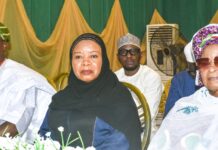Oando PLC Hosts 6th Edition of its Webinar Series
Oando PLC, Nigeria’s leading energy solutions provider, is set to host the 6th edition of its quarterly Webinar Series themed, ‘The State of Insecurity in Nigeria: The Tipping Point’ in partnership with the Nigerian Economic Summit Group (NESG) and Ventures Africa.
The webinar, scheduled to hold on Tuesday, September 07, 2021, at 12 p.m. (WAT), is free for all to attend and will feature a diverse panel of notable security experts. The panelists include Mr. Opeyemi Agbaje, CEO and Executive Secretary, Ogun State Security Trust Fund, Dr. Olajumoke Ayandele, Senior Researcher, Armed Conflict Location & Event Data Project (ACLED) Nigeria; Capt. Aliyu Umar Babangida (Retd.), CEO GoldWater & RiverSand Consults; and Dr. Patrick Agbambu, CEO, Security Watch Africa Initiatives. Mr. Ademola Ogunbanjo, General Manager, Business Support Group, Oando Energy Resources, will moderate the session.
Nigeria is faced with an unprecedented security crisis, from kidnapping to extremist insurgencies to clashes between herdsmen and farmers, to name a few; almost every corner of the country is being hit by violence and crime. Some have attributed the surge in insecurity to the staggering rate of poverty across the country.
Boko Haram is expanding into new territories in the North-east and fueling its extremist ideologies by taking advantage of the country’s security challenges as well as the poor, unemployed and uneducated masses. According to the United Nations, as of the end of 2020, conflict with the group had led to the deaths of almost 350,000 people.
One of the panelists, Dr. Olajumoke Ayandele authored an article titled, “Why Integrating Non-Military Actors in Security Strategies Can Stabilize the Lake Chad Region”, in which she stated that “Since 2009, Boko Haram and its splinter group, the Islamic State West Africa Province (ISWAP), have remained largely responsible for militant jihadist group activities in the four countries bordering the Lake Chad: Chad, Cameroon, Niger and Nigeria. The violence from the two groups has deepened instability, stifled economic growth and engendered humanitarian concerns”.
Violent clashes between herdsmen and farmers have exacerbated over the years. The death toll resulting from these clashes continues to see an upward trajectory as herders move further South looking for grazing ground. A report titled, “Fulani Militias’ Terror: Compilation of News (2017-2020)” revealed that herdsmen were responsible for 654 attacks, killed 2,539 and kidnapped 253 people in Nigeria between 2017 and May 2020. Continued tensions have led some state Governors to ban open grazing, which has in turn led to friction with the Federal Government.
Banditry is also on the rise with more than 1,000 students abducted from schools since December 2020, many only released after thousands of dollars were paid in ransom. According to a New Humanitarian article, entitled “The Longshot Bid to End Rampant Banditry in Nigeria’s Northwest”, over 200,000 people in North-West Nigeria have been displaced from their homes as of January 2021, due to the insecurity posed by insurgent and banditry activities.
The World Bank in its 2021 Nigeria Development Update (NDU), posited that the country’s economic growth is being hampered by heightened insecurity, food inflation and stalled reforms. Furthermore, the incessant herdsmen attacks on farming communities have caused the Nigerian agricultural sector unquantifiable loss, resulting in food import expenses exceeding revenue generated from exports by 395.44%.
The above are just a few examples of the different security issues plaguing the country. On a larger and more disconcerting scale, the insecurity has seen Nigeria rank 146th least peaceful country among 163 independent nations and territories, according to the 2021 Global Peace Index (GPI). The 2021 Fragile States Index report ranks Nigeria as the world’s 12th most fragile nation. In Africa, Nigeria ranks as the 8th least peaceful country after South Sudan, Somalia, the Democratic Republic of the Congo, Libya, Central African Republic, Sudan and Mali.
In an article on “Localizing Security, Safety in Africa” in Thisday Newspaper on February 25, 2020, another panelist, Dr. Patrick Agbambu, was quoted thus: “I have said that no meaningful development can take place in Africa or any part of the world if security is not taken care of. The biggest challenges we have in Africa is the issue of security and I believe that once it’s resolved, development will begin”.
It is against this backdrop that the 6th edition of the Oando webinar series will hold. The panelists, with combined industry experience of over thirty years, will examine pivotal issues surrounding security in Nigeria such as the effects of COVID-19 on insecurity, the role of the Government in alleviating the current crises, possible international intervention and collaboration, fundraising and deployment of artificial intelligence to improve security, to name a few.






